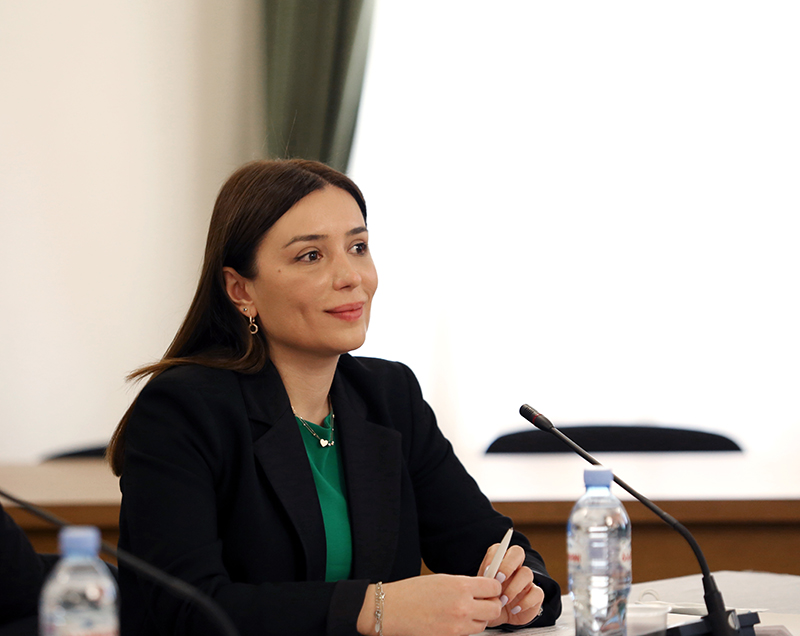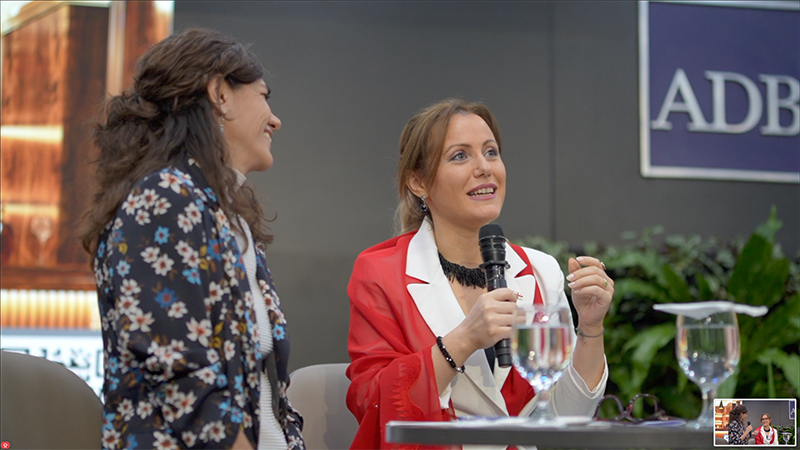Greening Up Tbilisi
The importance of state support in achieving the sustainable development goals is undeniable. All sectors engaged in the effort do their part to move towards this aim, and the role of the government of Tbilisi is remarkable in this regard.
Kakha Kaladze, Mayor of Tbilisi, talked to us about the participation of the capital in implementing the Sustainable Development Goals, on urban vision in this direction, on partnership with both the private and civil society sectors, on transport infrastructure development and about Tbilisi’s prospectives to become a green city.
What is the role of the Tbilisi Mayor’s Office in achieving the UN Sustainable Development Goals and do you have an action plan in this direction?
The Tbilisi Mayor’s Office actively cooperates with the UN and other organizations, including the World Health Organization, to make the capital better for living. In 2019 we adopted a Land Use Master Plan, according to which Tbilisi will become a green, resilient, and compact city.
That same year with support from the Asian Development Bank, the Municipality, together with the Tbilisi Development Fund and international company Ramboll, commenced work on a Sustainable Urban Mobility Plan (SUMP). Tbilisi the Land Use Master Plan and various transport and urban studies will be used as a foundation for the SUMP. An action plan will be drafted for short, mid and long-term strategies, which will be implemented over the next 20 years.
The main transport document of the capital will make it possible to develop Tbilisi transport infrastructure in accordance with modern requirements, reducing the traffic jams and adverse impact of emissions in the streets of the city.
The Residential Development Planning Guidelines, drawn up within Asian Development Bank project “Future Cities for Future Women”, is significant. The guidelines are a first attempt to bring such practical directives specified for Tbilisi urban development together, which can support the formation of a human- oriented, fair, inclusive and gender-sensitive residential environment. These reforms will bring Tbilisi closer to the UN Sustainable Development Goals.
What is the relevance of multi- sector cooperation (public- private partnership) when achieving the main Sustainable Development Goals and what is the engagement of the city in this process?
The UN 2015 Sustainable Development Goals provide a universal format, establishing an overarching and
high magnitude vision for systemic changes, which is necessary to create a sustainable global agenda. Collective effort is necessary for it, on both international and national levels. Therefore, multi-sector collaboration is one of the mandatory components in the ongoing transformation process. Especially, if we consider, that the challenges which the Sustainable Development Goals respond to are in their nature multisectoral.
In this direction, during the strategic planning process, Tbilisi municipality is actively cooperating with the non-government sector. They are engaged in each large-scale project in the capital. It is noteworthy that the strategic transport document of Tbilisi, the Sustainable Urban Mobility Plan (SUMP), is currently being drawn up with the active engagement from both the non-government sector and academia.
As for public-private partnership formats, currently, the municipality is reviewing the possibility of planning projects with this model and with the support of international partners, it is uncovering such projects.
What kind of partnership projects does the Government of Tbilisi run with non-government and private sectors in Tbilisi? Does it have programmes to support public-private partnership and what are the priorities?
Pursuant to the Green Plants (Forests) Management Plan, the Tbilisi Mayor’s Office, with the support of the German Agency for International Collaboration (GIZ), conducted the natural regeneration of natural pine forest on 20 ha, in four forest areas.
In 2019, with support from GIZ, a medium difficulty hiking trail connecting Turtle Lake with Mtatsminda was established, with a total distance of 6.8km. The aim of the project was to develop an educational and recreational trail, which enables the establishment of forest ecosystem services and underlines its relevance, as well as supports awareness raising campaigns on biodiversity.
With GIZ support the work on a strategy and action plan for forest policy institutional development commenced in 2020 and it is still underway, It will serve to ensure the establishment of efficient governance of municipal forests.
In 2020 a memorandum was signed between the Tbilisi Mayor’s Office and the Development and Environment Fund, which covers a plan to carry out reforestation activities over 677 hectares of space in Tbilisi. This area borders with central neighborhoods: Tsavkisi, Okrokana, Sololaki, Mtatsminda, Vera, Vake, Bagebi, Tskneti and Udzo Mountain areas and is the main focus for Tbilisi greening.
The Tbilisi Mayor’s Office is also engaged in a European Council Project aimed at strengthening and integrating citizen engagement mechanisms in municipal policy planning processes. The [roject’s goal is to establish a sustainable discussion/coordination platform, the Citizen Engagement Working Group, within which specific initiatives selected for urban parks and gardens renovation and/or construction shall be discussed and decided on with civil society organizations and citizens.
On January 20, 2021 Tbilisi Government approved a regulation on the “Creation and Operation
rules of Consultative Group for Holding Community Consultations for Tbilisi Municipality Park Planning Process”. This document sets out in detail the guidelines, sets out the stakeholders for engaging in the park planning process and describes their responsibilities. The Mayor’s Office used the same format for creating the Tbilisi Dendrology Park. Consultations on the Vera Park project are underway.
One of the significant projects which Tbilisi Mayor’s Office has adopted with the financial support of the European Bank of Reconstruction and Development, is the “Tbilisi, Green City Action Plan”, which is set out for 2017-2030 and envisages relevant activities in various directions, including, correct urban and environmental planning components for the capital. What is the current condition of this and how are projects derived from the plan being carried out?
The Green City Action Plan’s (2017- 2030) relevant directions are waste management, land management and biodiversity. The Green City Action Plan adopted in 2017 has defined the strategic goals and priorities, which, if achieved, will result in an ecologically clean, comfortable to live and healthy environment.
A strategic goal, which envisages the sustainable urban planning system establishment based on the Land Use Master Plan, is being executed from 2019, when the Land Use Master Plan for Tbilisi was approved. The Tbilisi Mayor’s Office makes decisions, issues permits and is engaged in a sustainable urban planning system based on this regulation.
The strategic goal of developing new green spaces within city bounds envisages the creation/rehabilitation of parks and gardens, as well as increasing the quantity of road and street green plants. It is noteworthy, that since 2018 the large scale rehabilitation of existing large and small gardens (20 units in 2018-2020) has been ongoing. Additionally, 30 road territories have been renovated, where green plants (trees, bushes, grass coverage) have been sown.
Rehabilitation and green planting have been ongoing for Tbilisi adjacent territories (slopes) to ensure protection from erosion, wind, landslides, and floods. Additionally, both banks of the Mtkvari River have been planted with large trunk trees to improve the embankment territories.
As for solid waste, Tbilisi Mayor’s Office has implemented a strategic goal with regards to a waste management plan. Pursuant to the Waste Management National Strategy and Action Plan, Tbilisi Waste Management Action Plan was drawn up in 2019, which outlines actions to be taken over the next five years (2019-2024), creating the basis for sustainable and efficient waste management system.
The Tbilisi Mayor’s Office works per the waste prevention and recycling strategy from 2020, the project of which (Tbilisi Solid Waste Project) is under development currently.
One of the significant parts of the “Tbilisi, Green City Plan” is the development of transport infrastructure. How is this direction adapted to global challenges and how will it support the implementation of the Sustainable Development Goals, including in respect to environmental security? How much have the views and needs of various sectors been considered when working on this project and were civil society organizations and business sector engaged in the process?
Tbilisi has been consistently implementing transport infrastructure activities, which, apart from drawing, also includes complex approaches, expressed in the replanning of streets oriented for vehicles Per the project, public transport and non-motor vehicles receive their own lane, ensuring their non-hindered movement, including during peak hours. Such an approach will cause a decrease in car-dependency, which will reflect positively on the environment.
The sustainable transport strategic planning process in Tbilisi envisages the renovation of the public transport system as well. Several steps have been made in this direction: starting with bus park renewal with ecologically clean transport and optimization of traffic network, ending with the modernization of the Tbilisi Metro and cable way transport development. In the process of restructuring the bus network, a hierarchical traffic network was drawn up (transit, precinct, and local lines), which includes 11 rapid transit corridors, a so-called Tbilisi bus Transit (TBT) formation which serves the main streets and traffic corridors for large-capacity rapid buses.
The establishment of a zonal, hourly parking system is significant. Citizens need to download mobile application Tbilisi Parking and through electronic payment methods can use paid parking spots. The application includes a map with zoning parking areas by numbers. Parking spots are free of charge for people with disabilities and electric car owners.
How is it possible to incentivize private companies when implementing important projects for the capital? Is there any vision in this direction?
When coming up with the Development Regulation Plan (DRP), the Tbilisi Mayor’s Office reviews
all proposed documents together with the private companies during the process of issuing permits. Surrounding conditions are considered based on agreement and both parties make a maximum effort to support the sustainable development of the city. This means that when implementing important projects, recreation spaces and green coverage should be preserved.
Through this policy the Tbilisi Mayor’s Office incentivizes private companies to make their own contribution in the sustainable development of the city.




 Search
Search





